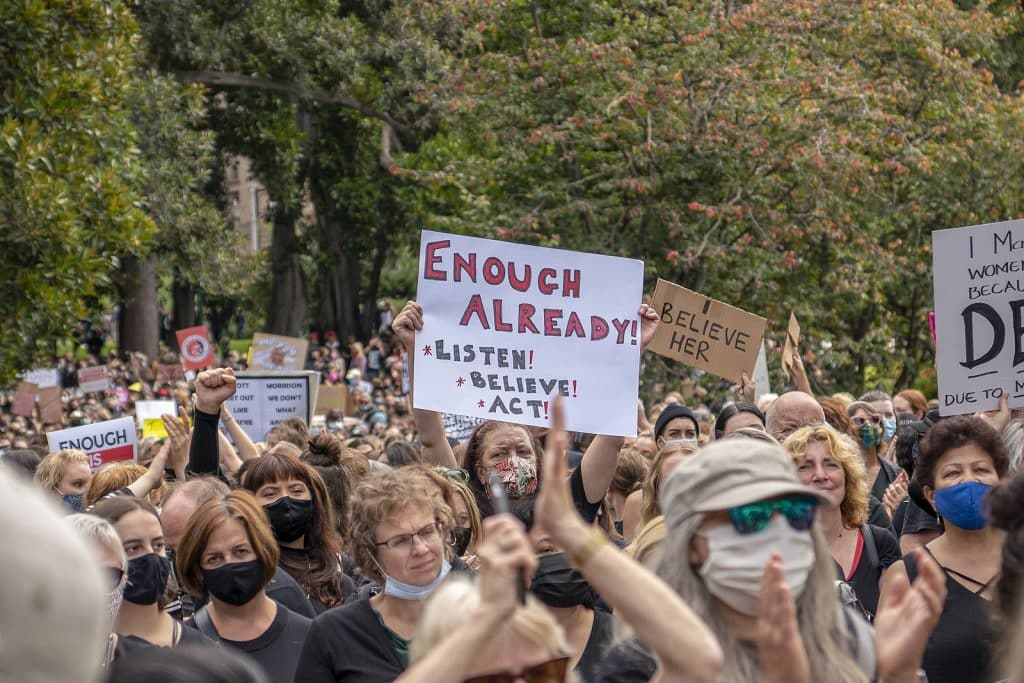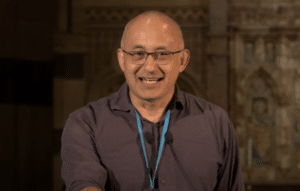
Reverend Hannah Craven
7 November 2022
Early last year it felt like women in Australia were having a moment. Grace Tame had just been named Australian of the Year, Brittany Higgins had gone public with her story of alleged rape by a Liberal staffer in Parliament House, and three other women also came forward claiming to have been assaulted by the same man. Add unresolved allegations about Attorney-General Christian Porter, and Australian women had finally had enough.
March 2021 saw a national event called March4Justice involving tens of thousands of Australians across 40 locations. At an event at Parliament House, Brittany Higgins spoke, saying: “There is a horrible societal acceptance of sexual violence experienced by women in Australia”. The protests were focused not just on the prevalence of sexual violence in Australia, but on our society’s seeming indifference. Our failure – at so many levels – to see, hear, care and respond.
A poster for the march featured an image of a woman’s face, mouth wide open, shouting “Enough!” Women marched on Parliament House to be seen and heard, and to demand justice. In the sun that day in solidarity there was rage, but there was also optimism. Maybe this was a tipping point? Maybe Australian women’s everyday experience of sexual harassment, assault and abuse, might finally begin to be heard and to be seen. Maybe something might change.
Read more: Enter Grace Tame, an answer to prayer: Reverend Alison Andrew
Eighteen plus months later, as I write, Brittany Higgins’ case is just now in court. We have heard how Grace Tame has been repeatedly harassed online by her childhood abuser. Both women have been treated so terribly and so viciously in the public and online discourse that each have voluntarily been admitted to hospital seeking mental health support – aware that they are not coping with what it costs to go public about these issues. Christian Porter’s accuser had already died by suicide.
For so many victims of sexual assault, and other forms of injustice, there is a calculation that happens as you decide whether to seek justice. The likelihood of success is weighed up against what it will cost. A recent Netflix show Unbelievable explored this dynamic powerfully. In this world – even in our country, our city – justice can be hard to come by. Even when you’re in the right, justice is by no means guaranteed.
In Luke 18:1-8 Jesus tells a story about a woman who deserved justice and had to fight hard to get it. Though often overlooked, perhaps this is one of Jesus’ most enduring parables.
Then Jesus told his disciples a parable to show them that they should always pray and not give up. He said: “In a certain town there was a judge who neither feared God nor cared what people thought. And there was a widow in that town who kept coming to him with the plea, ‘Grant me justice against my adversary.’
For some time he refused. But finally he said to himself, ‘Even though I don’t fear God or care what people think, yet because this widow keeps bothering me, I will see that she gets justice, so that she won’t eventually come and attack me!’”
And the Lord said, “Listen to what the unjust judge says. And will not God bring about justice for his chosen ones, who cry out to him day and night? Will he keep putting them off? I tell you, he will see that they get justice, and quickly. However, when the Son of Man comes, will he find faith on the earth?”
In this form of parable, the character and actions of God are compared and contrasted with those of a character in the story. Here the judge’s actions are contrasted with God’s. If a corrupt judge will eventually grant justice to this widow just because she keeps asking, how much more will God bring about justice for his chosen ones who face trouble? The parable is not teaching that God is just like the judge: unjust, corrupt, lazy, and needing to be badgered into responding. No, it says God’s justice is quick and sure and proceeds from love. God does justice, because he is just.
Read more: Society still struggles to address abuse. Understanding power imbalance is key
The character of the widow is a model too. In this case a model for discipleship. Her persistence is lauded as a picture of faith and a model for prayer. Luke’s narrative context and Jesus’ framing words give the parable an eschatological bent – the promise of justice when the Son of Man returns. But Luke’s eschatology is famously multi-faceted. The kingdom of God has both present and future dimensions that are not incompatible. Belief in the future coming of Jesus doesn’t render the present irrelevant, because in Jesus’ birth God’s future has already begun.
The arrival of the Kingdom in the person of Jesus brought the previously-thought-future justice of God to the here and now in very concrete ways, including in Jesus’ own interactions with widows and vulnerable women. For the widow of Nain (Luke 7:11-17) and the bleeding woman (Luke 8:42b-48), Jesus’ miracles weren’t just to inspire or encourage. No, they brought tangible real-world benefits: physical healing led economic improvement and renewed opportunity for social and religious participation.
So this courageous widow shows us a little of what it really looks like to persevere in prayer for the coming of God’s Kingdom. She doesn’t give up her pursuit of justice despite the failures of the very man whose job it was to secure it. And she shows us that just as we trust that God will deliver justice in the future, we also pursue it now. Prayer and the active pursuit of justice go hand in hand. Our prayers and our lives work in tandem.
As St Basil the Great writes in his homily On the Martyr Julitta:
“We should not express our prayer merely in syllables, but the power of prayer should be expressed in the moral attitude of our soul and in the virtuous actions that extend throughout our life … This is how you pray continually – not by offering prayer in words, but by joining yourself to God through your whole way of life, so that your life becomes one continuous and uninterrupted prayer.”
God is on the side of those who seek justice. And as Christians we should be too. This parable offers us both profound optimism, and profound realism. The work will be hard, and very often fail. But we persist.
I do think we are at a tipping point, but perhaps not the one we really want. We are just now only beginning to discover the truth of the extent of the abuses and cover ups in society, in our churches, and in our institutions. To face this truth will take courage, and unwavering faith in our God of truth and justice. Faith that truth is good even when it’s uncomfortable, and that justice is good even when it rocks the boat. The Christian church has too often been the worst at this, when we ought to have been the best. Our faith in God should empower us with a distinctive capacity to hold the truth of even the very darkest and most heinous crimes. To hear the unspeakable, to name the unnameable. We can’t do it in our own strength. But we can carry it, because Christ does and has.
An example of this is Rachael Denhollander, one of among almost 200 young women who was sexually abused as a child by the United States gymnastics team coach Larry Nassar. Rachael was the first woman to come forward to speak publicly about Nassar’s abuse, but by going public she made it possible for others to do so too. At Nassar’s trial, somewhere between 150 and 200 women gave evidence of his abuse. Part of what enabled Rachael to do what she did – and what enables her still in her ongoing work for survivors – is her Christian faith. She knows that in this work, God is on her side. In 2018, Larry Nassar was given a life sentence in prison. Shortly after, Rachael and her family left their church after concerns about the mishandling of sexual abuse cases in their denomination. She is still waiting – along with many others – to see justice there.
When the Son of Man comes, God will assuredly grant justice to his chosen ones who cry to him day and night. We must persevere in prayer and faith. Persevere through challenge, and temptation, and suffering. But God is amongst us to work justice today too. And his light, his truth, his goodness, and his justice, are our Kingdom work as well as our prayers. This parable encourages us to persevere in prayer and in faithful work for the Kingdom of God now – for truth and for justice for Australian women and for all.
Come Lord Jesus.
For more faith news, follow The Melbourne Anglican on Facebook, Twitter, or subscribe to our weekly emails.






